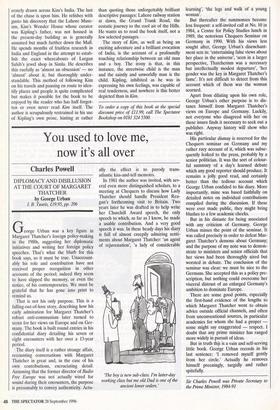You used to love me, now it's all over
Charles Powell
DIPLOMACY AND DISILLUSION AT THE COURT OF MARGARET THATCHER by George Urban 1 B. Tauris, f19.95, pp. 206 George Urban was a key figure in Margaret Thatcher's foreign policy-making in the 1980s, suggesting her diplomatic initiatives and writing her foreign policy speeches. That's what the blurb for this book says, so it must be true. Unaccount- ably his role and contribution have not received proper recognition in other accounts of the period; indeed they seem to have slipped the memory, or even the notice, of his contemporaries. We must be grateful that he has gone into print to remind us.
That is not his only purpose. This is a falling-out-of-love story, describing how his early admiration for Margaret Thatcher's robust anti-communism later turned to scorn for her views on Europe and on Ger- many. The book is built round entries in his confidential diary detailing his seven or eight encounters with her over a 13-year period.
The diary itself is a rather strange affair, recounting conversations with Margaret Thatcher in great and, in the case of his own contributions, excruciating detail. Assuming that the former director of Radio Free Europe was not actually wired for sound during their encounters, the purpose is presumably to convey authenticity. Actu-
ally the effect is to parody trans- atlantic kiss-and-tell memoirs.
In 1981 the author was invited, with sev- eral even more distinguished scholars, to a meeting at Chequers to discuss how Lady Thatcher should handle President Rea- gan's forthcoming visit to Britain. Two years later he was drafted in to help write her Churchill Award speech, the only speech to which, as far as I know, he made a usable contribution. And a very good speech it was. In these heady days his diary is full of almost creepily admiring senti- ments about Margaret Thatcher: 'an agent of rejuvenation', 'a lady of considerable 'The boy is new sub-class. I'm latter-day working class but me old Dad is one of the ancient lower orders.' learning', 'the legs and walk of a young woman'.
But thereafter the summonses become less frequent: a self-invited call at No. 10 in 1984, a Centre for Policy Studies lunch in 1989, the notorious Chequers Seminar on Germany in 1990. With his views less sought after, George Urban's disenchant- ment sets in: 'entertaining false views about her place in the universe', 'seen in a larger perspective, Thatcherism was a necessary but intellectually modest departure', 'her gender was the key in Margaret Thatcher's fame'. It's not difficult to detect from this account which of them was the woman scorned.
Apart from dilating upon his own role, George Urban's other purpose is to dis- tance himself from Margaret Thatcher's views on Europe and Germany. Luckily, not everyone who disagreed with her on these issues finds it necessary to seek out a publisher. Anyway history will show who was right.
His particular dismay is reserved for the Chequers seminar on Germany and my rather racy account of it, which was subse- quently leaked to the press, probably by a senior politician. It was the sort of colour- ful summary of a day's learned debate which any good reporter should produce. It remains a jolly good read, and certainly better than the tedious account which George Urban confided to his diary. More importantly, mine was based faithfully on detailed notes on individual contributions compiled during the discussion. If these were ever made public, they might bring blushes to a few academic cheeks.
But in his distaste for being associated with any criticism of Germany, George Urban misses the point of the seminar. It was called precisely in order to defeat Mar- garet Thatcher's demons about Germany; and the purpose of my note was to demon- strate to ministers and senior officials that her views had been thoroughly aired but worsted in debate. The conclusion of the seminar was clear: we must be nice to the Germans. She accepted this as a policy pre- scription, but nothing could overcome her visceral distrust of an enlarged Germany's ambition to dominate Europe.
There are some good points, especially the first-hand evidence of the lengths to which Margaret Thatcher went to obtain advice outside official channels, and often from unconventional sources, in particular academics for whom she had a proper some might say exaggerated — respect. I doubt that any prime minister has ranged more widely in pursuit of ideas.
But in truth this is a vain and self-serving little book. George Urban records in his last sentence: 'I removed myself gently from her circle.' Actually he removes himself preeningly, turgidly and rather spitefully.
Sir Charles Powell was Private Secretary to the Prime Minister, 1984-91


















































































 Previous page
Previous page